Ethics of Business in Financial Advice: FASEA Code Analysis
VerifiedAdded on 2022/09/22
|13
|3989
|27
Report
AI Summary
This report delves into the ethical considerations within the financial advisory profession, focusing on the FASEA Code of Ethics. It examines a case study involving a para-planner, Sam, and her interactions with a client, Kelly King, highlighting potential violations of ethical standards, particularly Standard 2. The report analyzes potential barriers to ethical decision-making, such as assumptions based on a client's financial background, and recommends strategies for financial advisors to avoid such pitfalls. Furthermore, it explores the application of ethical frameworks, such as the Consequentialist Theory, and the importance of obtaining informed consent from clients. The report also addresses the obligations of financial advisors, including record-keeping requirements and the need for transparency in providing financial advice, as outlined by the FASEA Code. Overall, the report emphasizes the significance of ethical conduct in financial planning and the need for advisors to prioritize client interests and adhere to professional standards.
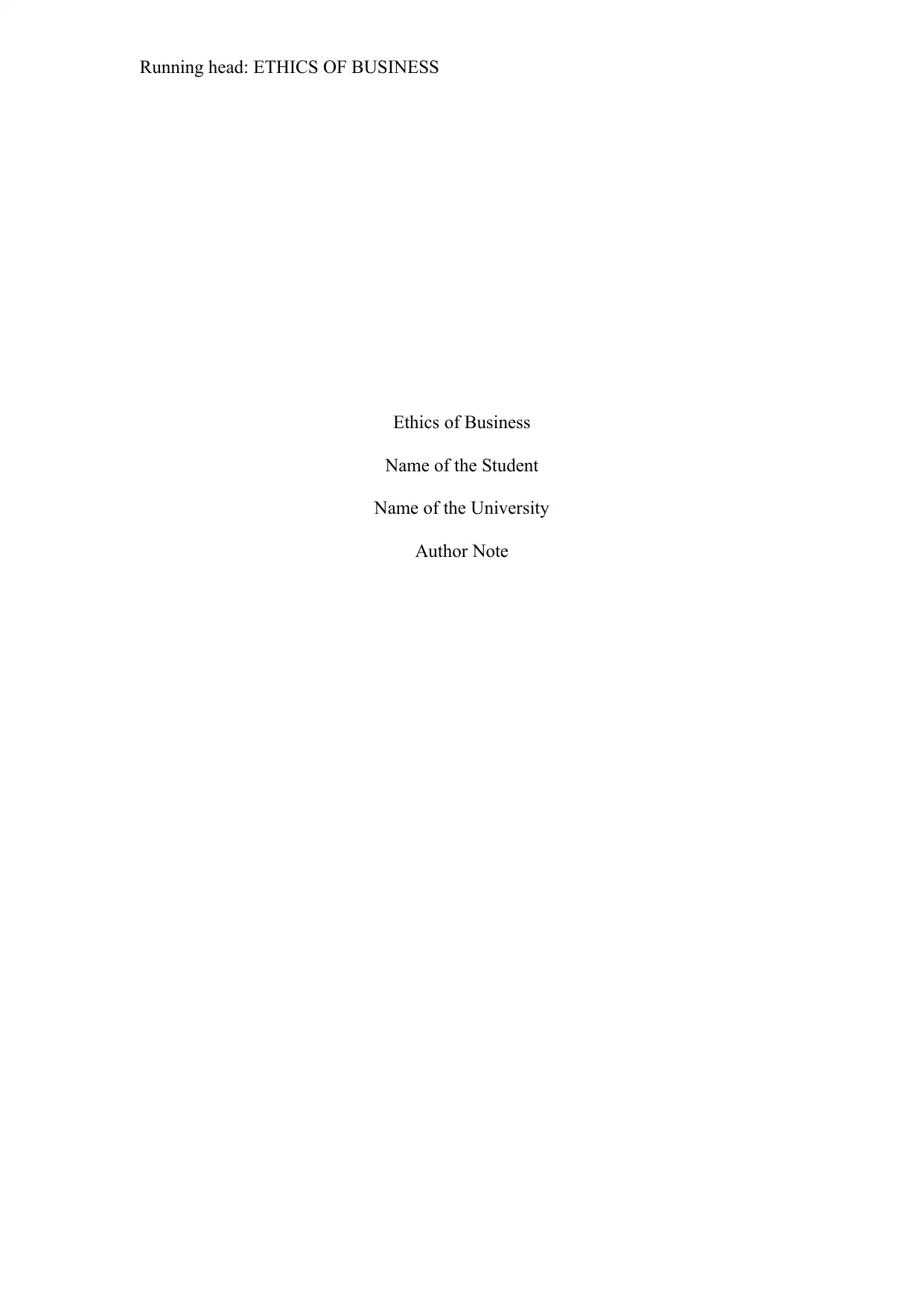
Running head: ETHICS OF BUSINESS
Ethics of Business
Name of the Student
Name of the University
Author Note
Ethics of Business
Name of the Student
Name of the University
Author Note
Paraphrase This Document
Need a fresh take? Get an instant paraphrase of this document with our AI Paraphraser
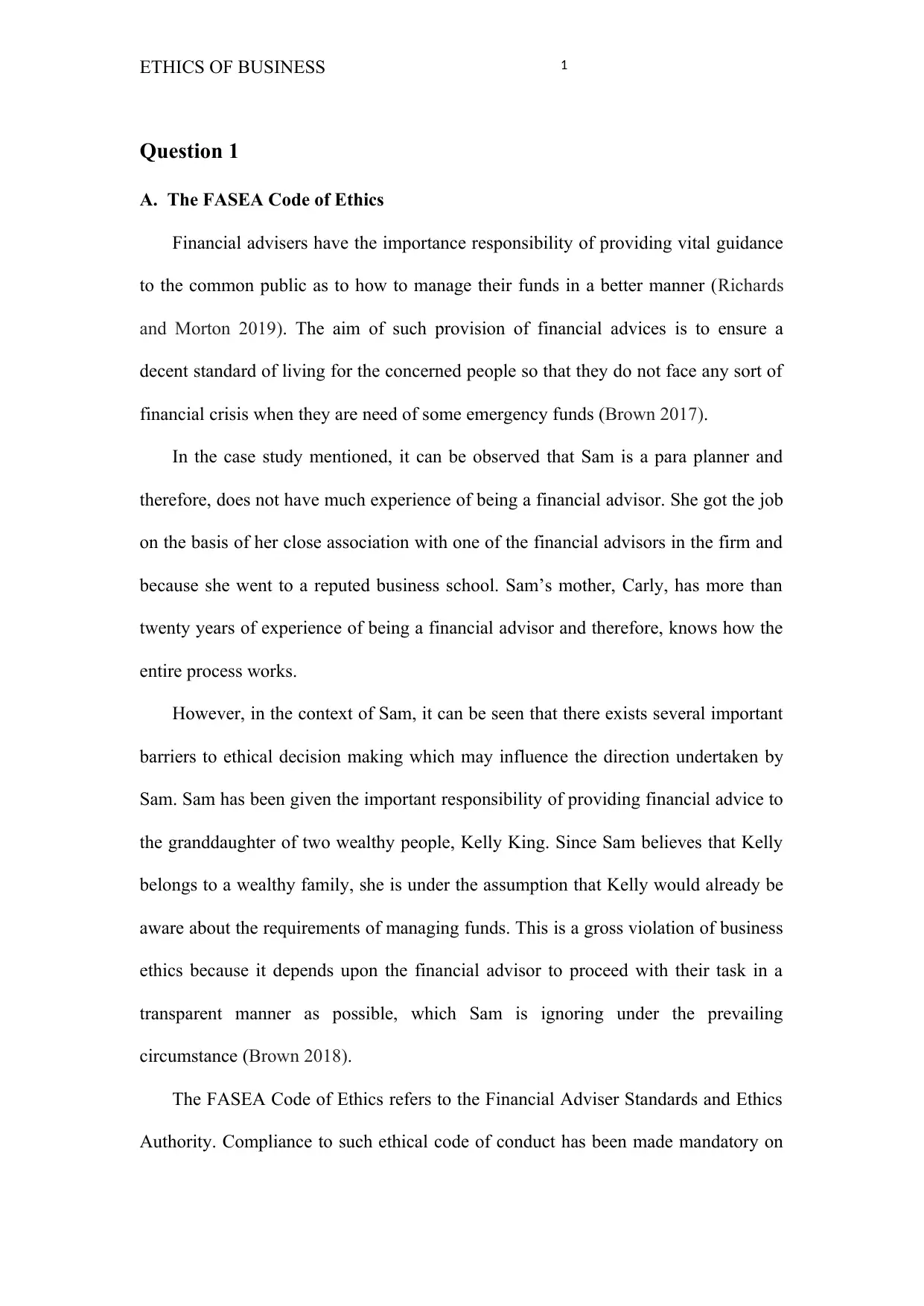
1ETHICS OF BUSINESS
Question 1
A. The FASEA Code of Ethics
Financial advisers have the importance responsibility of providing vital guidance
to the common public as to how to manage their funds in a better manner (Richards
and Morton 2019). The aim of such provision of financial advices is to ensure a
decent standard of living for the concerned people so that they do not face any sort of
financial crisis when they are need of some emergency funds (Brown 2017).
In the case study mentioned, it can be observed that Sam is a para planner and
therefore, does not have much experience of being a financial advisor. She got the job
on the basis of her close association with one of the financial advisors in the firm and
because she went to a reputed business school. Sam’s mother, Carly, has more than
twenty years of experience of being a financial advisor and therefore, knows how the
entire process works.
However, in the context of Sam, it can be seen that there exists several important
barriers to ethical decision making which may influence the direction undertaken by
Sam. Sam has been given the important responsibility of providing financial advice to
the granddaughter of two wealthy people, Kelly King. Since Sam believes that Kelly
belongs to a wealthy family, she is under the assumption that Kelly would already be
aware about the requirements of managing funds. This is a gross violation of business
ethics because it depends upon the financial advisor to proceed with their task in a
transparent manner as possible, which Sam is ignoring under the prevailing
circumstance (Brown 2018).
The FASEA Code of Ethics refers to the Financial Adviser Standards and Ethics
Authority. Compliance to such ethical code of conduct has been made mandatory on
Question 1
A. The FASEA Code of Ethics
Financial advisers have the importance responsibility of providing vital guidance
to the common public as to how to manage their funds in a better manner (Richards
and Morton 2019). The aim of such provision of financial advices is to ensure a
decent standard of living for the concerned people so that they do not face any sort of
financial crisis when they are need of some emergency funds (Brown 2017).
In the case study mentioned, it can be observed that Sam is a para planner and
therefore, does not have much experience of being a financial advisor. She got the job
on the basis of her close association with one of the financial advisors in the firm and
because she went to a reputed business school. Sam’s mother, Carly, has more than
twenty years of experience of being a financial advisor and therefore, knows how the
entire process works.
However, in the context of Sam, it can be seen that there exists several important
barriers to ethical decision making which may influence the direction undertaken by
Sam. Sam has been given the important responsibility of providing financial advice to
the granddaughter of two wealthy people, Kelly King. Since Sam believes that Kelly
belongs to a wealthy family, she is under the assumption that Kelly would already be
aware about the requirements of managing funds. This is a gross violation of business
ethics because it depends upon the financial advisor to proceed with their task in a
transparent manner as possible, which Sam is ignoring under the prevailing
circumstance (Brown 2018).
The FASEA Code of Ethics refers to the Financial Adviser Standards and Ethics
Authority. Compliance to such ethical code of conduct has been made mandatory on
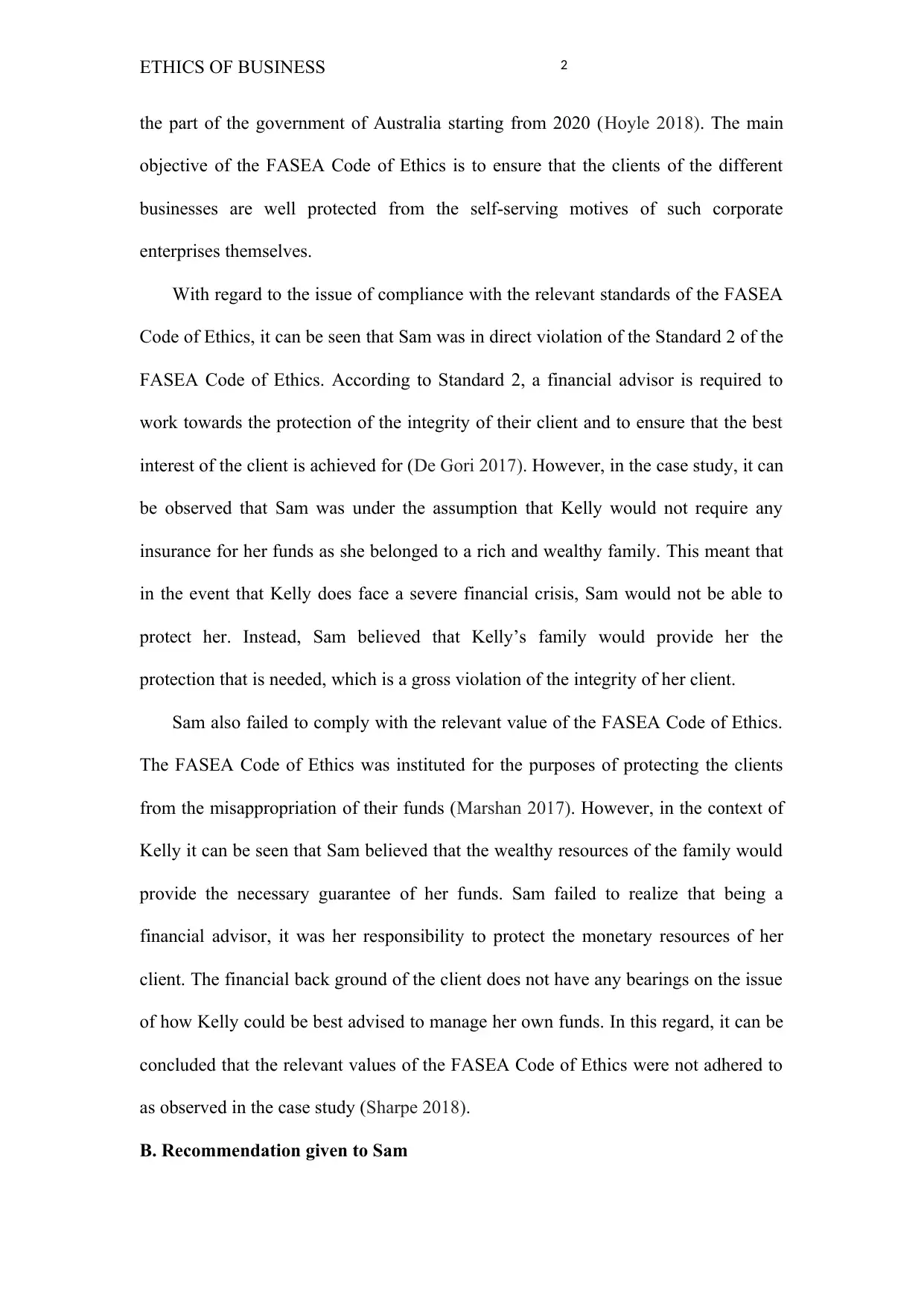
2ETHICS OF BUSINESS
the part of the government of Australia starting from 2020 (Hoyle 2018). The main
objective of the FASEA Code of Ethics is to ensure that the clients of the different
businesses are well protected from the self-serving motives of such corporate
enterprises themselves.
With regard to the issue of compliance with the relevant standards of the FASEA
Code of Ethics, it can be seen that Sam was in direct violation of the Standard 2 of the
FASEA Code of Ethics. According to Standard 2, a financial advisor is required to
work towards the protection of the integrity of their client and to ensure that the best
interest of the client is achieved for (De Gori 2017). However, in the case study, it can
be observed that Sam was under the assumption that Kelly would not require any
insurance for her funds as she belonged to a rich and wealthy family. This meant that
in the event that Kelly does face a severe financial crisis, Sam would not be able to
protect her. Instead, Sam believed that Kelly’s family would provide her the
protection that is needed, which is a gross violation of the integrity of her client.
Sam also failed to comply with the relevant value of the FASEA Code of Ethics.
The FASEA Code of Ethics was instituted for the purposes of protecting the clients
from the misappropriation of their funds (Marshan 2017). However, in the context of
Kelly it can be seen that Sam believed that the wealthy resources of the family would
provide the necessary guarantee of her funds. Sam failed to realize that being a
financial advisor, it was her responsibility to protect the monetary resources of her
client. The financial back ground of the client does not have any bearings on the issue
of how Kelly could be best advised to manage her own funds. In this regard, it can be
concluded that the relevant values of the FASEA Code of Ethics were not adhered to
as observed in the case study (Sharpe 2018).
B. Recommendation given to Sam
the part of the government of Australia starting from 2020 (Hoyle 2018). The main
objective of the FASEA Code of Ethics is to ensure that the clients of the different
businesses are well protected from the self-serving motives of such corporate
enterprises themselves.
With regard to the issue of compliance with the relevant standards of the FASEA
Code of Ethics, it can be seen that Sam was in direct violation of the Standard 2 of the
FASEA Code of Ethics. According to Standard 2, a financial advisor is required to
work towards the protection of the integrity of their client and to ensure that the best
interest of the client is achieved for (De Gori 2017). However, in the case study, it can
be observed that Sam was under the assumption that Kelly would not require any
insurance for her funds as she belonged to a rich and wealthy family. This meant that
in the event that Kelly does face a severe financial crisis, Sam would not be able to
protect her. Instead, Sam believed that Kelly’s family would provide her the
protection that is needed, which is a gross violation of the integrity of her client.
Sam also failed to comply with the relevant value of the FASEA Code of Ethics.
The FASEA Code of Ethics was instituted for the purposes of protecting the clients
from the misappropriation of their funds (Marshan 2017). However, in the context of
Kelly it can be seen that Sam believed that the wealthy resources of the family would
provide the necessary guarantee of her funds. Sam failed to realize that being a
financial advisor, it was her responsibility to protect the monetary resources of her
client. The financial back ground of the client does not have any bearings on the issue
of how Kelly could be best advised to manage her own funds. In this regard, it can be
concluded that the relevant values of the FASEA Code of Ethics were not adhered to
as observed in the case study (Sharpe 2018).
B. Recommendation given to Sam
⊘ This is a preview!⊘
Do you want full access?
Subscribe today to unlock all pages.

Trusted by 1+ million students worldwide
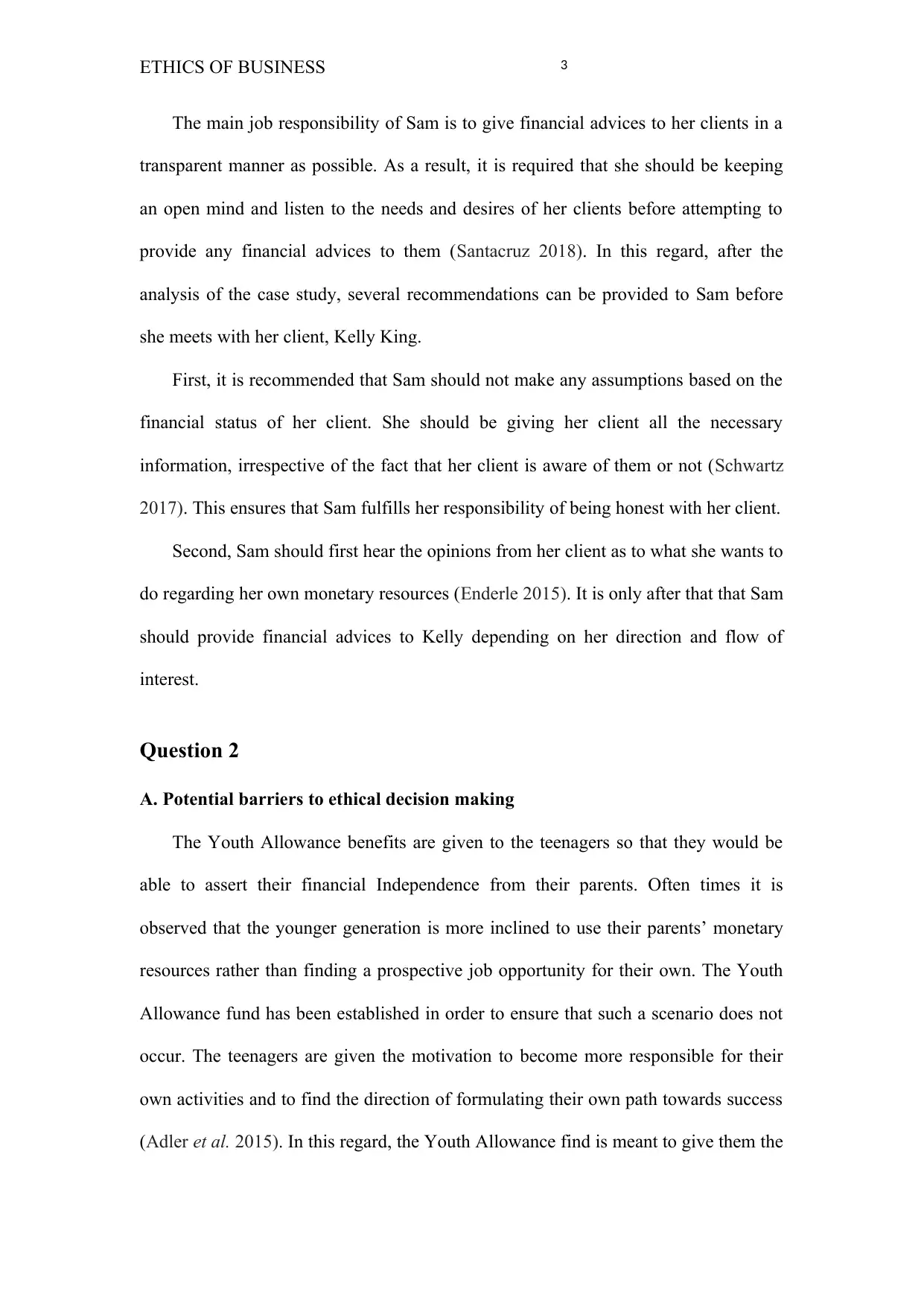
3ETHICS OF BUSINESS
The main job responsibility of Sam is to give financial advices to her clients in a
transparent manner as possible. As a result, it is required that she should be keeping
an open mind and listen to the needs and desires of her clients before attempting to
provide any financial advices to them (Santacruz 2018). In this regard, after the
analysis of the case study, several recommendations can be provided to Sam before
she meets with her client, Kelly King.
First, it is recommended that Sam should not make any assumptions based on the
financial status of her client. She should be giving her client all the necessary
information, irrespective of the fact that her client is aware of them or not (Schwartz
2017). This ensures that Sam fulfills her responsibility of being honest with her client.
Second, Sam should first hear the opinions from her client as to what she wants to
do regarding her own monetary resources (Enderle 2015). It is only after that that Sam
should provide financial advices to Kelly depending on her direction and flow of
interest.
Question 2
A. Potential barriers to ethical decision making
The Youth Allowance benefits are given to the teenagers so that they would be
able to assert their financial Independence from their parents. Often times it is
observed that the younger generation is more inclined to use their parents’ monetary
resources rather than finding a prospective job opportunity for their own. The Youth
Allowance fund has been established in order to ensure that such a scenario does not
occur. The teenagers are given the motivation to become more responsible for their
own activities and to find the direction of formulating their own path towards success
(Adler et al. 2015). In this regard, the Youth Allowance find is meant to give them the
The main job responsibility of Sam is to give financial advices to her clients in a
transparent manner as possible. As a result, it is required that she should be keeping
an open mind and listen to the needs and desires of her clients before attempting to
provide any financial advices to them (Santacruz 2018). In this regard, after the
analysis of the case study, several recommendations can be provided to Sam before
she meets with her client, Kelly King.
First, it is recommended that Sam should not make any assumptions based on the
financial status of her client. She should be giving her client all the necessary
information, irrespective of the fact that her client is aware of them or not (Schwartz
2017). This ensures that Sam fulfills her responsibility of being honest with her client.
Second, Sam should first hear the opinions from her client as to what she wants to
do regarding her own monetary resources (Enderle 2015). It is only after that that Sam
should provide financial advices to Kelly depending on her direction and flow of
interest.
Question 2
A. Potential barriers to ethical decision making
The Youth Allowance benefits are given to the teenagers so that they would be
able to assert their financial Independence from their parents. Often times it is
observed that the younger generation is more inclined to use their parents’ monetary
resources rather than finding a prospective job opportunity for their own. The Youth
Allowance fund has been established in order to ensure that such a scenario does not
occur. The teenagers are given the motivation to become more responsible for their
own activities and to find the direction of formulating their own path towards success
(Adler et al. 2015). In this regard, the Youth Allowance find is meant to give them the
Paraphrase This Document
Need a fresh take? Get an instant paraphrase of this document with our AI Paraphraser
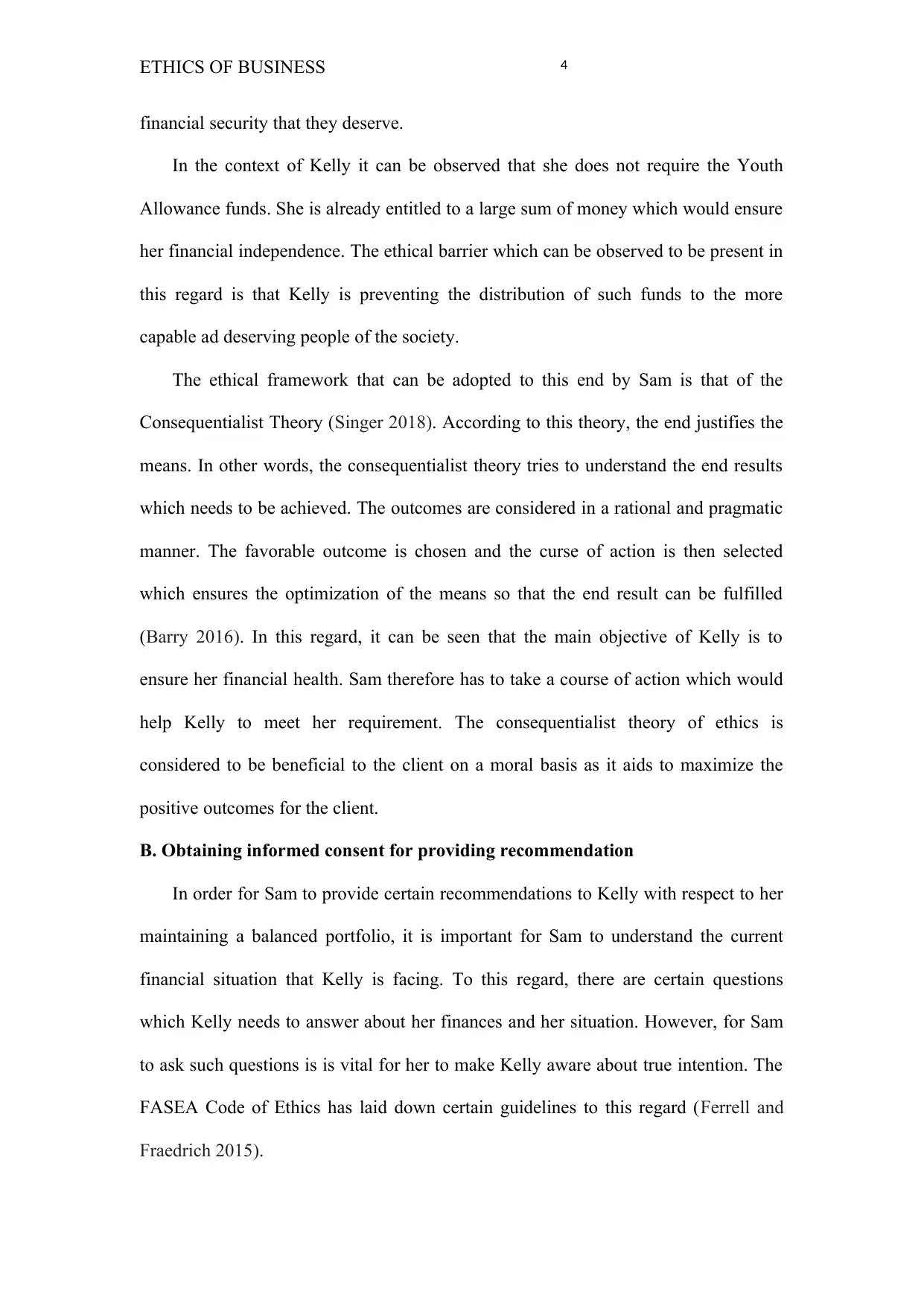
4ETHICS OF BUSINESS
financial security that they deserve.
In the context of Kelly it can be observed that she does not require the Youth
Allowance funds. She is already entitled to a large sum of money which would ensure
her financial independence. The ethical barrier which can be observed to be present in
this regard is that Kelly is preventing the distribution of such funds to the more
capable ad deserving people of the society.
The ethical framework that can be adopted to this end by Sam is that of the
Consequentialist Theory (Singer 2018). According to this theory, the end justifies the
means. In other words, the consequentialist theory tries to understand the end results
which needs to be achieved. The outcomes are considered in a rational and pragmatic
manner. The favorable outcome is chosen and the curse of action is then selected
which ensures the optimization of the means so that the end result can be fulfilled
(Barry 2016). In this regard, it can be seen that the main objective of Kelly is to
ensure her financial health. Sam therefore has to take a course of action which would
help Kelly to meet her requirement. The consequentialist theory of ethics is
considered to be beneficial to the client on a moral basis as it aids to maximize the
positive outcomes for the client.
B. Obtaining informed consent for providing recommendation
In order for Sam to provide certain recommendations to Kelly with respect to her
maintaining a balanced portfolio, it is important for Sam to understand the current
financial situation that Kelly is facing. To this regard, there are certain questions
which Kelly needs to answer about her finances and her situation. However, for Sam
to ask such questions is is vital for her to make Kelly aware about true intention. The
FASEA Code of Ethics has laid down certain guidelines to this regard (Ferrell and
Fraedrich 2015).
financial security that they deserve.
In the context of Kelly it can be observed that she does not require the Youth
Allowance funds. She is already entitled to a large sum of money which would ensure
her financial independence. The ethical barrier which can be observed to be present in
this regard is that Kelly is preventing the distribution of such funds to the more
capable ad deserving people of the society.
The ethical framework that can be adopted to this end by Sam is that of the
Consequentialist Theory (Singer 2018). According to this theory, the end justifies the
means. In other words, the consequentialist theory tries to understand the end results
which needs to be achieved. The outcomes are considered in a rational and pragmatic
manner. The favorable outcome is chosen and the curse of action is then selected
which ensures the optimization of the means so that the end result can be fulfilled
(Barry 2016). In this regard, it can be seen that the main objective of Kelly is to
ensure her financial health. Sam therefore has to take a course of action which would
help Kelly to meet her requirement. The consequentialist theory of ethics is
considered to be beneficial to the client on a moral basis as it aids to maximize the
positive outcomes for the client.
B. Obtaining informed consent for providing recommendation
In order for Sam to provide certain recommendations to Kelly with respect to her
maintaining a balanced portfolio, it is important for Sam to understand the current
financial situation that Kelly is facing. To this regard, there are certain questions
which Kelly needs to answer about her finances and her situation. However, for Sam
to ask such questions is is vital for her to make Kelly aware about true intention. The
FASEA Code of Ethics has laid down certain guidelines to this regard (Ferrell and
Fraedrich 2015).
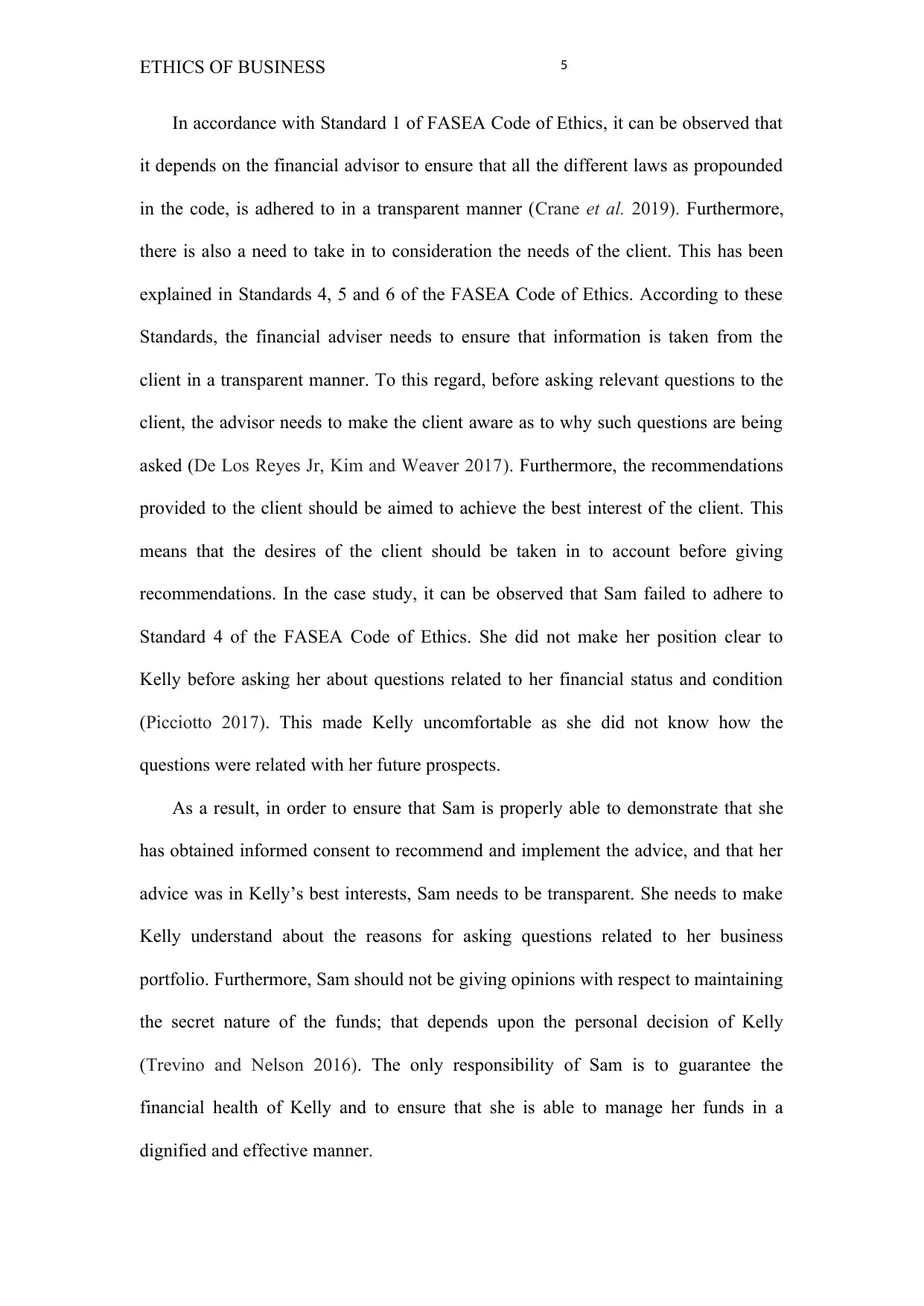
5ETHICS OF BUSINESS
In accordance with Standard 1 of FASEA Code of Ethics, it can be observed that
it depends on the financial advisor to ensure that all the different laws as propounded
in the code, is adhered to in a transparent manner (Crane et al. 2019). Furthermore,
there is also a need to take in to consideration the needs of the client. This has been
explained in Standards 4, 5 and 6 of the FASEA Code of Ethics. According to these
Standards, the financial adviser needs to ensure that information is taken from the
client in a transparent manner. To this regard, before asking relevant questions to the
client, the advisor needs to make the client aware as to why such questions are being
asked (De Los Reyes Jr, Kim and Weaver 2017). Furthermore, the recommendations
provided to the client should be aimed to achieve the best interest of the client. This
means that the desires of the client should be taken in to account before giving
recommendations. In the case study, it can be observed that Sam failed to adhere to
Standard 4 of the FASEA Code of Ethics. She did not make her position clear to
Kelly before asking her about questions related to her financial status and condition
(Picciotto 2017). This made Kelly uncomfortable as she did not know how the
questions were related with her future prospects.
As a result, in order to ensure that Sam is properly able to demonstrate that she
has obtained informed consent to recommend and implement the advice, and that her
advice was in Kelly’s best interests, Sam needs to be transparent. She needs to make
Kelly understand about the reasons for asking questions related to her business
portfolio. Furthermore, Sam should not be giving opinions with respect to maintaining
the secret nature of the funds; that depends upon the personal decision of Kelly
(Trevino and Nelson 2016). The only responsibility of Sam is to guarantee the
financial health of Kelly and to ensure that she is able to manage her funds in a
dignified and effective manner.
In accordance with Standard 1 of FASEA Code of Ethics, it can be observed that
it depends on the financial advisor to ensure that all the different laws as propounded
in the code, is adhered to in a transparent manner (Crane et al. 2019). Furthermore,
there is also a need to take in to consideration the needs of the client. This has been
explained in Standards 4, 5 and 6 of the FASEA Code of Ethics. According to these
Standards, the financial adviser needs to ensure that information is taken from the
client in a transparent manner. To this regard, before asking relevant questions to the
client, the advisor needs to make the client aware as to why such questions are being
asked (De Los Reyes Jr, Kim and Weaver 2017). Furthermore, the recommendations
provided to the client should be aimed to achieve the best interest of the client. This
means that the desires of the client should be taken in to account before giving
recommendations. In the case study, it can be observed that Sam failed to adhere to
Standard 4 of the FASEA Code of Ethics. She did not make her position clear to
Kelly before asking her about questions related to her financial status and condition
(Picciotto 2017). This made Kelly uncomfortable as she did not know how the
questions were related with her future prospects.
As a result, in order to ensure that Sam is properly able to demonstrate that she
has obtained informed consent to recommend and implement the advice, and that her
advice was in Kelly’s best interests, Sam needs to be transparent. She needs to make
Kelly understand about the reasons for asking questions related to her business
portfolio. Furthermore, Sam should not be giving opinions with respect to maintaining
the secret nature of the funds; that depends upon the personal decision of Kelly
(Trevino and Nelson 2016). The only responsibility of Sam is to guarantee the
financial health of Kelly and to ensure that she is able to manage her funds in a
dignified and effective manner.
⊘ This is a preview!⊘
Do you want full access?
Subscribe today to unlock all pages.

Trusted by 1+ million students worldwide
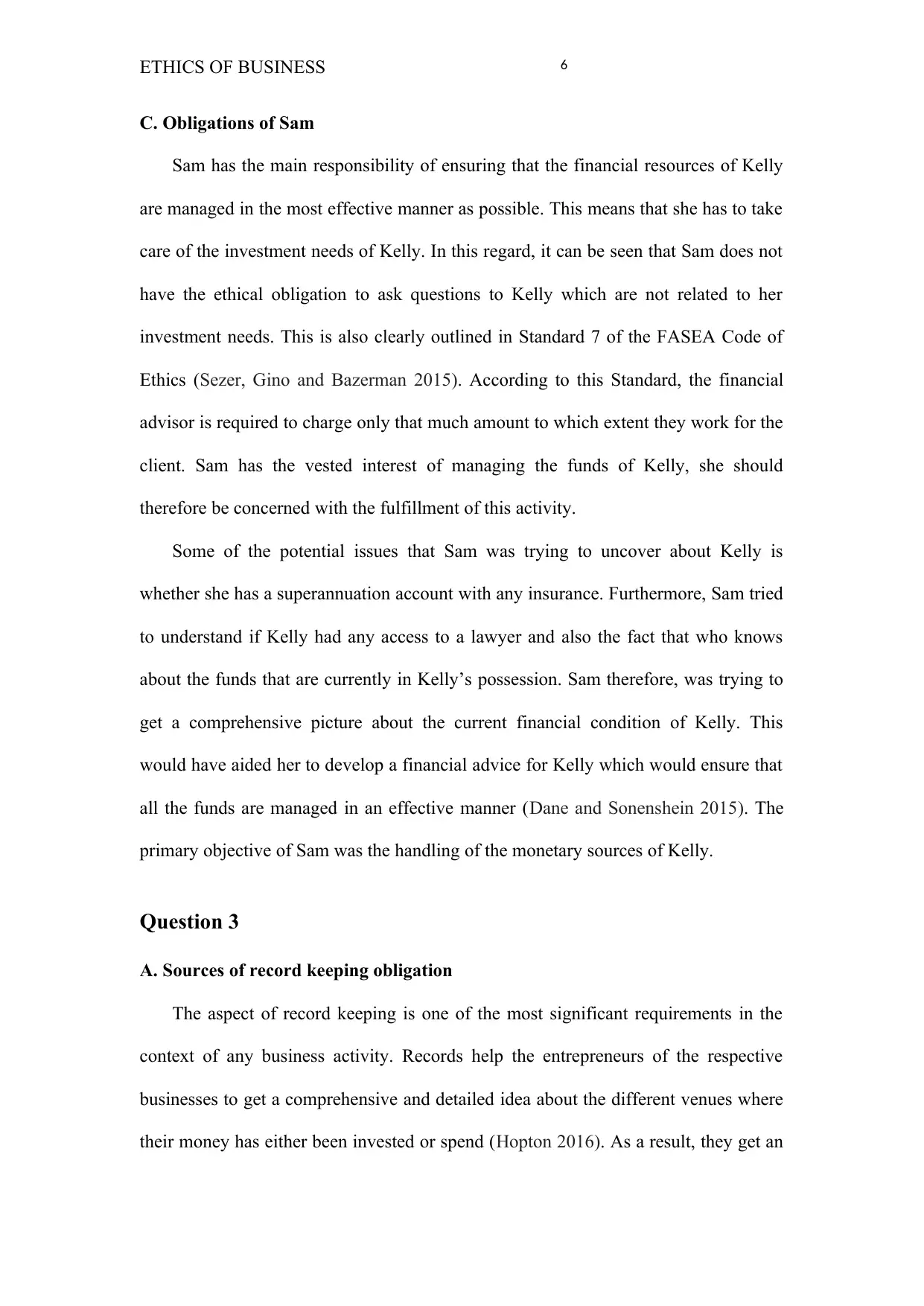
6ETHICS OF BUSINESS
C. Obligations of Sam
Sam has the main responsibility of ensuring that the financial resources of Kelly
are managed in the most effective manner as possible. This means that she has to take
care of the investment needs of Kelly. In this regard, it can be seen that Sam does not
have the ethical obligation to ask questions to Kelly which are not related to her
investment needs. This is also clearly outlined in Standard 7 of the FASEA Code of
Ethics (Sezer, Gino and Bazerman 2015). According to this Standard, the financial
advisor is required to charge only that much amount to which extent they work for the
client. Sam has the vested interest of managing the funds of Kelly, she should
therefore be concerned with the fulfillment of this activity.
Some of the potential issues that Sam was trying to uncover about Kelly is
whether she has a superannuation account with any insurance. Furthermore, Sam tried
to understand if Kelly had any access to a lawyer and also the fact that who knows
about the funds that are currently in Kelly’s possession. Sam therefore, was trying to
get a comprehensive picture about the current financial condition of Kelly. This
would have aided her to develop a financial advice for Kelly which would ensure that
all the funds are managed in an effective manner (Dane and Sonenshein 2015). The
primary objective of Sam was the handling of the monetary sources of Kelly.
Question 3
A. Sources of record keeping obligation
The aspect of record keeping is one of the most significant requirements in the
context of any business activity. Records help the entrepreneurs of the respective
businesses to get a comprehensive and detailed idea about the different venues where
their money has either been invested or spend (Hopton 2016). As a result, they get an
C. Obligations of Sam
Sam has the main responsibility of ensuring that the financial resources of Kelly
are managed in the most effective manner as possible. This means that she has to take
care of the investment needs of Kelly. In this regard, it can be seen that Sam does not
have the ethical obligation to ask questions to Kelly which are not related to her
investment needs. This is also clearly outlined in Standard 7 of the FASEA Code of
Ethics (Sezer, Gino and Bazerman 2015). According to this Standard, the financial
advisor is required to charge only that much amount to which extent they work for the
client. Sam has the vested interest of managing the funds of Kelly, she should
therefore be concerned with the fulfillment of this activity.
Some of the potential issues that Sam was trying to uncover about Kelly is
whether she has a superannuation account with any insurance. Furthermore, Sam tried
to understand if Kelly had any access to a lawyer and also the fact that who knows
about the funds that are currently in Kelly’s possession. Sam therefore, was trying to
get a comprehensive picture about the current financial condition of Kelly. This
would have aided her to develop a financial advice for Kelly which would ensure that
all the funds are managed in an effective manner (Dane and Sonenshein 2015). The
primary objective of Sam was the handling of the monetary sources of Kelly.
Question 3
A. Sources of record keeping obligation
The aspect of record keeping is one of the most significant requirements in the
context of any business activity. Records help the entrepreneurs of the respective
businesses to get a comprehensive and detailed idea about the different venues where
their money has either been invested or spend (Hopton 2016). As a result, they get an
Paraphrase This Document
Need a fresh take? Get an instant paraphrase of this document with our AI Paraphraser
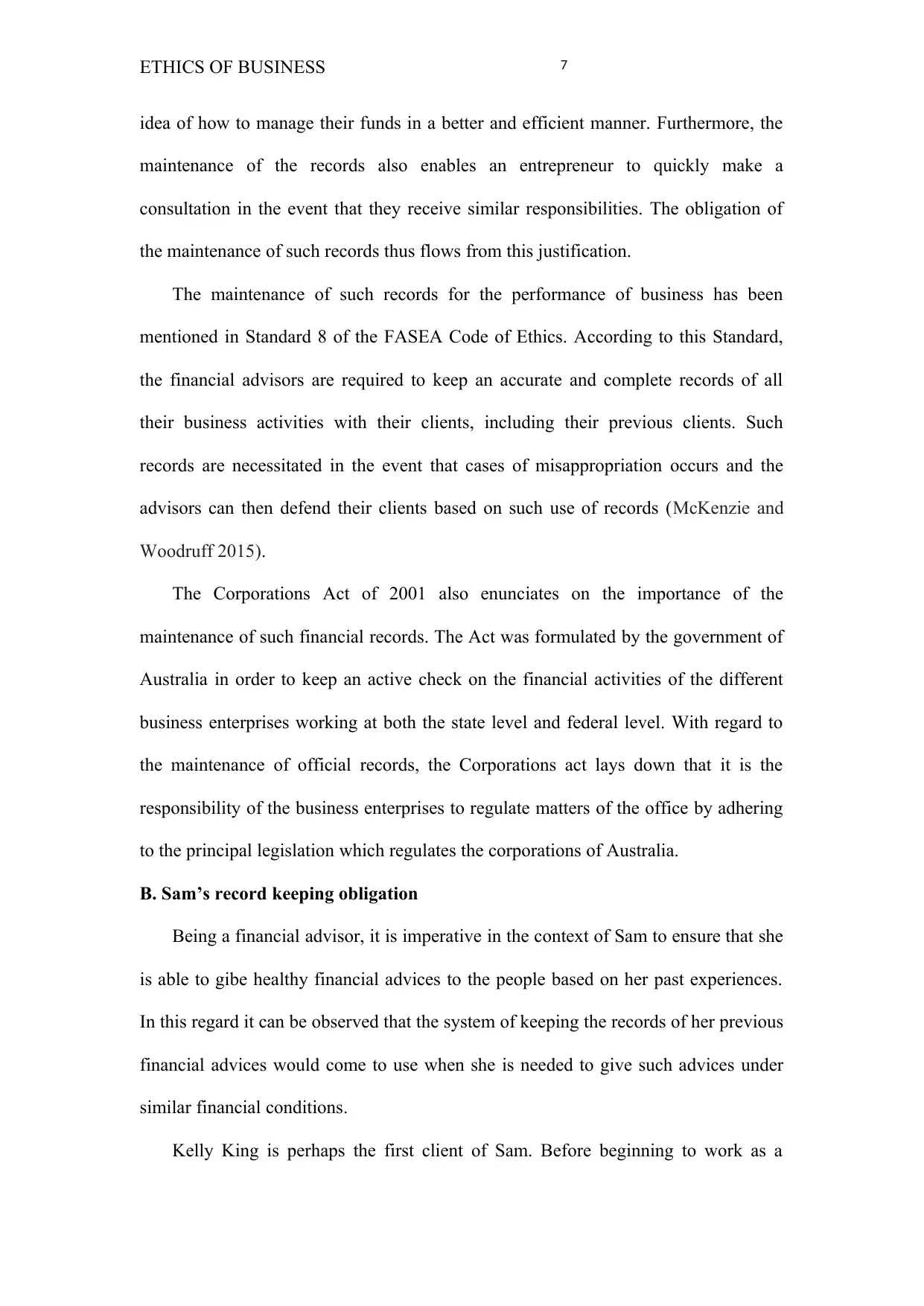
7ETHICS OF BUSINESS
idea of how to manage their funds in a better and efficient manner. Furthermore, the
maintenance of the records also enables an entrepreneur to quickly make a
consultation in the event that they receive similar responsibilities. The obligation of
the maintenance of such records thus flows from this justification.
The maintenance of such records for the performance of business has been
mentioned in Standard 8 of the FASEA Code of Ethics. According to this Standard,
the financial advisors are required to keep an accurate and complete records of all
their business activities with their clients, including their previous clients. Such
records are necessitated in the event that cases of misappropriation occurs and the
advisors can then defend their clients based on such use of records (McKenzie and
Woodruff 2015).
The Corporations Act of 2001 also enunciates on the importance of the
maintenance of such financial records. The Act was formulated by the government of
Australia in order to keep an active check on the financial activities of the different
business enterprises working at both the state level and federal level. With regard to
the maintenance of official records, the Corporations act lays down that it is the
responsibility of the business enterprises to regulate matters of the office by adhering
to the principal legislation which regulates the corporations of Australia.
B. Sam’s record keeping obligation
Being a financial advisor, it is imperative in the context of Sam to ensure that she
is able to gibe healthy financial advices to the people based on her past experiences.
In this regard it can be observed that the system of keeping the records of her previous
financial advices would come to use when she is needed to give such advices under
similar financial conditions.
Kelly King is perhaps the first client of Sam. Before beginning to work as a
idea of how to manage their funds in a better and efficient manner. Furthermore, the
maintenance of the records also enables an entrepreneur to quickly make a
consultation in the event that they receive similar responsibilities. The obligation of
the maintenance of such records thus flows from this justification.
The maintenance of such records for the performance of business has been
mentioned in Standard 8 of the FASEA Code of Ethics. According to this Standard,
the financial advisors are required to keep an accurate and complete records of all
their business activities with their clients, including their previous clients. Such
records are necessitated in the event that cases of misappropriation occurs and the
advisors can then defend their clients based on such use of records (McKenzie and
Woodruff 2015).
The Corporations Act of 2001 also enunciates on the importance of the
maintenance of such financial records. The Act was formulated by the government of
Australia in order to keep an active check on the financial activities of the different
business enterprises working at both the state level and federal level. With regard to
the maintenance of official records, the Corporations act lays down that it is the
responsibility of the business enterprises to regulate matters of the office by adhering
to the principal legislation which regulates the corporations of Australia.
B. Sam’s record keeping obligation
Being a financial advisor, it is imperative in the context of Sam to ensure that she
is able to gibe healthy financial advices to the people based on her past experiences.
In this regard it can be observed that the system of keeping the records of her previous
financial advices would come to use when she is needed to give such advices under
similar financial conditions.
Kelly King is perhaps the first client of Sam. Before beginning to work as a
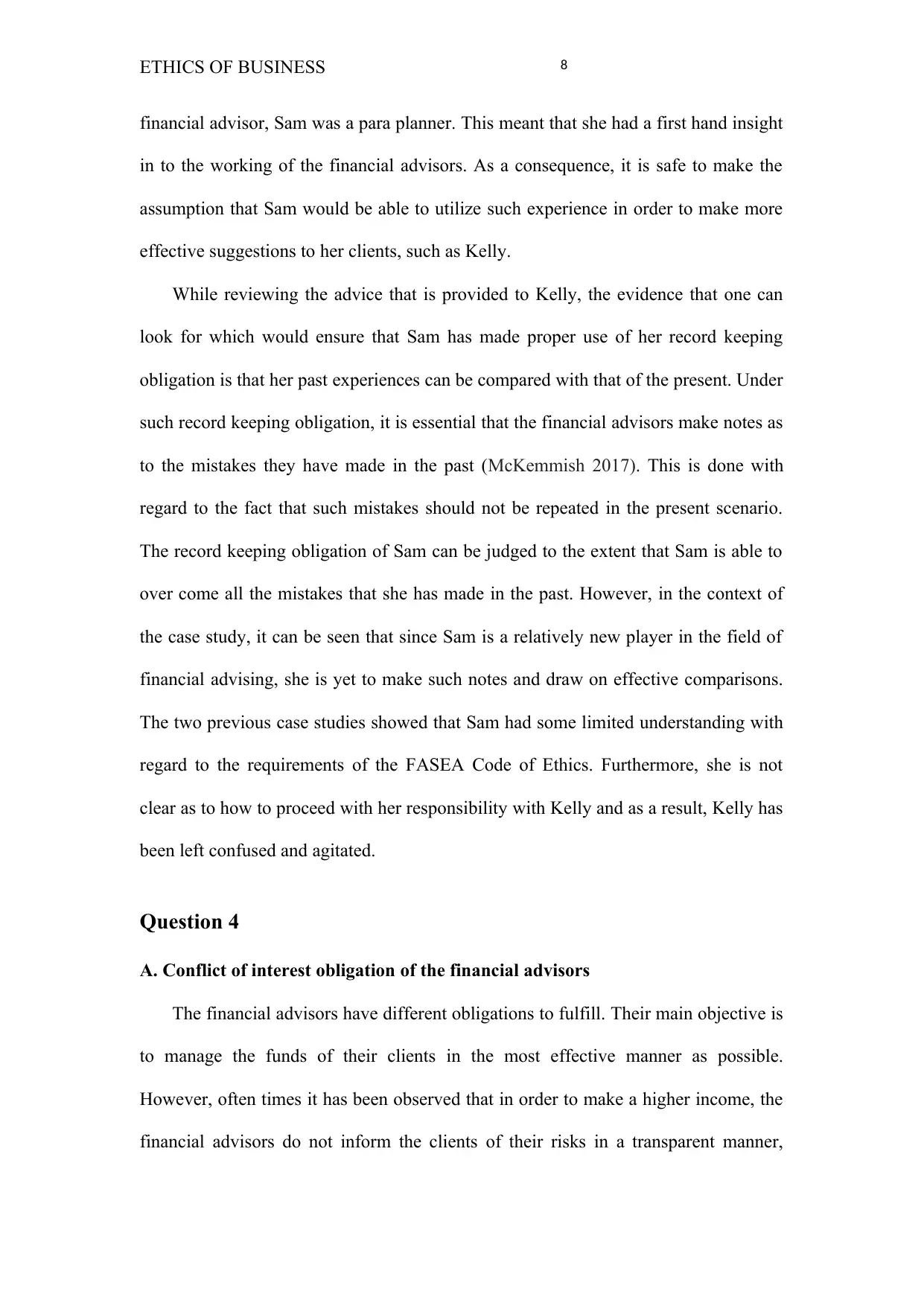
8ETHICS OF BUSINESS
financial advisor, Sam was a para planner. This meant that she had a first hand insight
in to the working of the financial advisors. As a consequence, it is safe to make the
assumption that Sam would be able to utilize such experience in order to make more
effective suggestions to her clients, such as Kelly.
While reviewing the advice that is provided to Kelly, the evidence that one can
look for which would ensure that Sam has made proper use of her record keeping
obligation is that her past experiences can be compared with that of the present. Under
such record keeping obligation, it is essential that the financial advisors make notes as
to the mistakes they have made in the past (McKemmish 2017). This is done with
regard to the fact that such mistakes should not be repeated in the present scenario.
The record keeping obligation of Sam can be judged to the extent that Sam is able to
over come all the mistakes that she has made in the past. However, in the context of
the case study, it can be seen that since Sam is a relatively new player in the field of
financial advising, she is yet to make such notes and draw on effective comparisons.
The two previous case studies showed that Sam had some limited understanding with
regard to the requirements of the FASEA Code of Ethics. Furthermore, she is not
clear as to how to proceed with her responsibility with Kelly and as a result, Kelly has
been left confused and agitated.
Question 4
A. Conflict of interest obligation of the financial advisors
The financial advisors have different obligations to fulfill. Their main objective is
to manage the funds of their clients in the most effective manner as possible.
However, often times it has been observed that in order to make a higher income, the
financial advisors do not inform the clients of their risks in a transparent manner,
financial advisor, Sam was a para planner. This meant that she had a first hand insight
in to the working of the financial advisors. As a consequence, it is safe to make the
assumption that Sam would be able to utilize such experience in order to make more
effective suggestions to her clients, such as Kelly.
While reviewing the advice that is provided to Kelly, the evidence that one can
look for which would ensure that Sam has made proper use of her record keeping
obligation is that her past experiences can be compared with that of the present. Under
such record keeping obligation, it is essential that the financial advisors make notes as
to the mistakes they have made in the past (McKemmish 2017). This is done with
regard to the fact that such mistakes should not be repeated in the present scenario.
The record keeping obligation of Sam can be judged to the extent that Sam is able to
over come all the mistakes that she has made in the past. However, in the context of
the case study, it can be seen that since Sam is a relatively new player in the field of
financial advising, she is yet to make such notes and draw on effective comparisons.
The two previous case studies showed that Sam had some limited understanding with
regard to the requirements of the FASEA Code of Ethics. Furthermore, she is not
clear as to how to proceed with her responsibility with Kelly and as a result, Kelly has
been left confused and agitated.
Question 4
A. Conflict of interest obligation of the financial advisors
The financial advisors have different obligations to fulfill. Their main objective is
to manage the funds of their clients in the most effective manner as possible.
However, often times it has been observed that in order to make a higher income, the
financial advisors do not inform the clients of their risks in a transparent manner,
⊘ This is a preview!⊘
Do you want full access?
Subscribe today to unlock all pages.

Trusted by 1+ million students worldwide
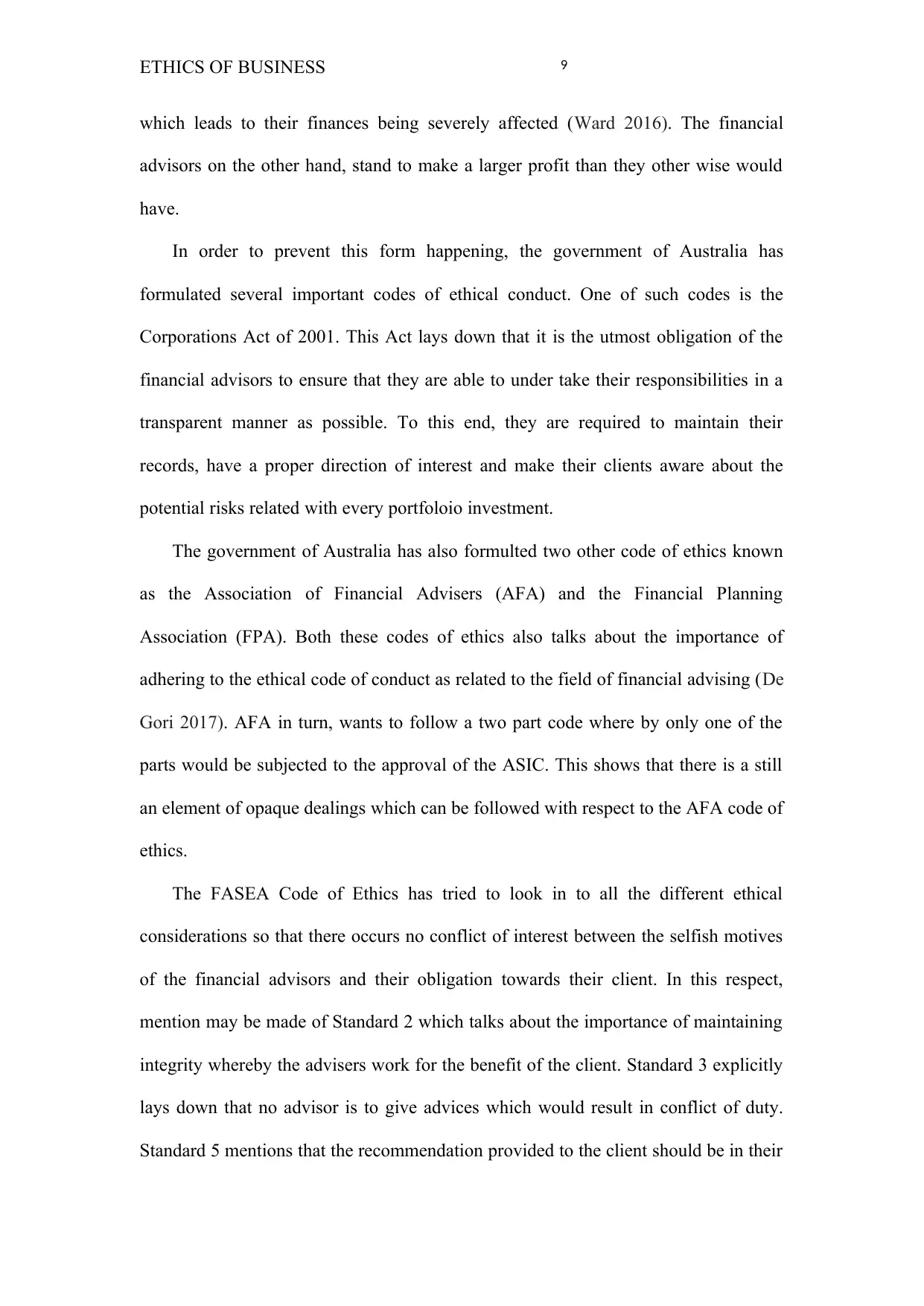
9ETHICS OF BUSINESS
which leads to their finances being severely affected (Ward 2016). The financial
advisors on the other hand, stand to make a larger profit than they other wise would
have.
In order to prevent this form happening, the government of Australia has
formulated several important codes of ethical conduct. One of such codes is the
Corporations Act of 2001. This Act lays down that it is the utmost obligation of the
financial advisors to ensure that they are able to under take their responsibilities in a
transparent manner as possible. To this end, they are required to maintain their
records, have a proper direction of interest and make their clients aware about the
potential risks related with every portfoloio investment.
The government of Australia has also formulted two other code of ethics known
as the Association of Financial Advisers (AFA) and the Financial Planning
Association (FPA). Both these codes of ethics also talks about the importance of
adhering to the ethical code of conduct as related to the field of financial advising (De
Gori 2017). AFA in turn, wants to follow a two part code where by only one of the
parts would be subjected to the approval of the ASIC. This shows that there is a still
an element of opaque dealings which can be followed with respect to the AFA code of
ethics.
The FASEA Code of Ethics has tried to look in to all the different ethical
considerations so that there occurs no conflict of interest between the selfish motives
of the financial advisors and their obligation towards their client. In this respect,
mention may be made of Standard 2 which talks about the importance of maintaining
integrity whereby the advisers work for the benefit of the client. Standard 3 explicitly
lays down that no advisor is to give advices which would result in conflict of duty.
Standard 5 mentions that the recommendation provided to the client should be in their
which leads to their finances being severely affected (Ward 2016). The financial
advisors on the other hand, stand to make a larger profit than they other wise would
have.
In order to prevent this form happening, the government of Australia has
formulated several important codes of ethical conduct. One of such codes is the
Corporations Act of 2001. This Act lays down that it is the utmost obligation of the
financial advisors to ensure that they are able to under take their responsibilities in a
transparent manner as possible. To this end, they are required to maintain their
records, have a proper direction of interest and make their clients aware about the
potential risks related with every portfoloio investment.
The government of Australia has also formulted two other code of ethics known
as the Association of Financial Advisers (AFA) and the Financial Planning
Association (FPA). Both these codes of ethics also talks about the importance of
adhering to the ethical code of conduct as related to the field of financial advising (De
Gori 2017). AFA in turn, wants to follow a two part code where by only one of the
parts would be subjected to the approval of the ASIC. This shows that there is a still
an element of opaque dealings which can be followed with respect to the AFA code of
ethics.
The FASEA Code of Ethics has tried to look in to all the different ethical
considerations so that there occurs no conflict of interest between the selfish motives
of the financial advisors and their obligation towards their client. In this respect,
mention may be made of Standard 2 which talks about the importance of maintaining
integrity whereby the advisers work for the benefit of the client. Standard 3 explicitly
lays down that no advisor is to give advices which would result in conflict of duty.
Standard 5 mentions that the recommendation provided to the client should be in their
Paraphrase This Document
Need a fresh take? Get an instant paraphrase of this document with our AI Paraphraser
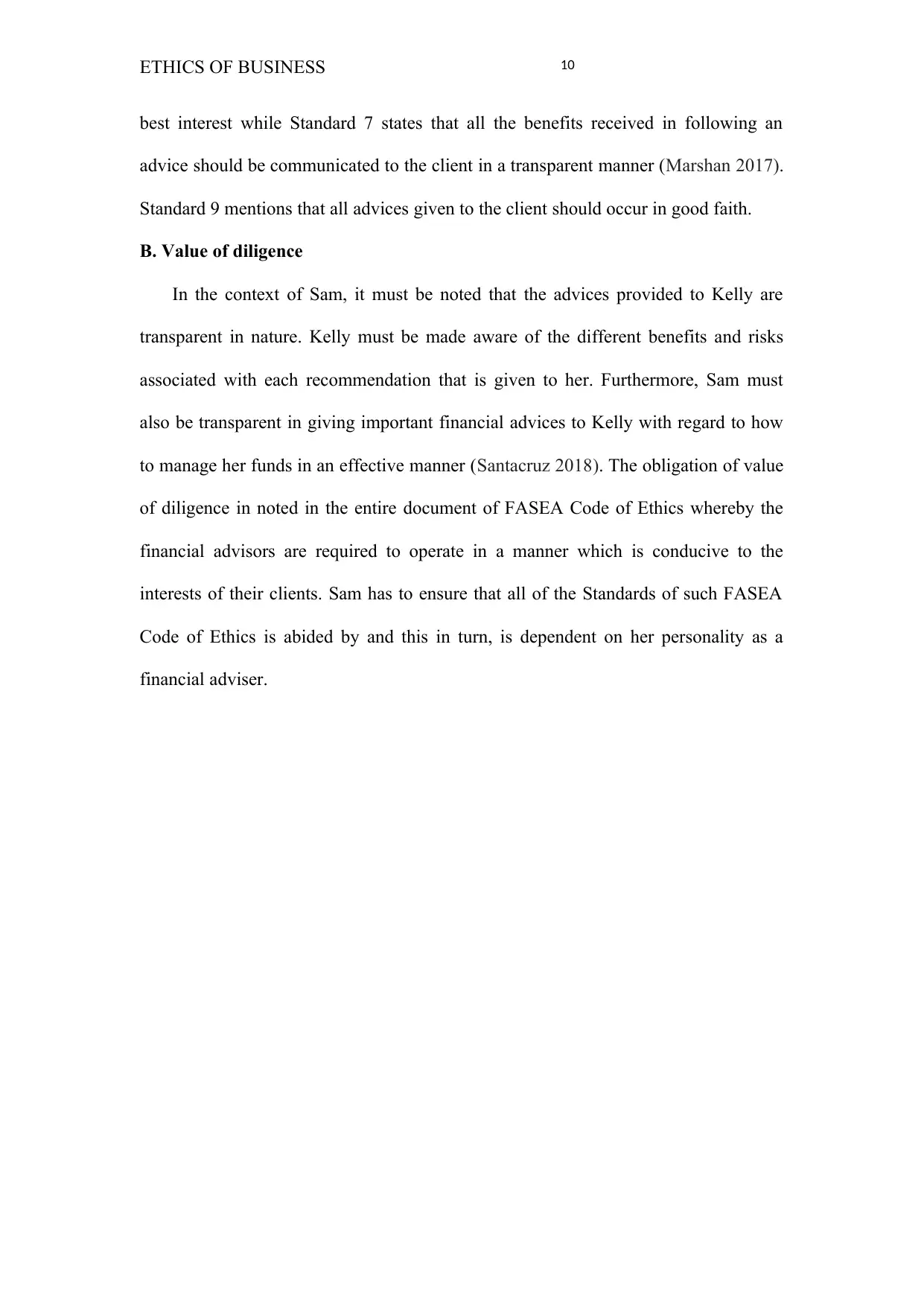
10ETHICS OF BUSINESS
best interest while Standard 7 states that all the benefits received in following an
advice should be communicated to the client in a transparent manner (Marshan 2017).
Standard 9 mentions that all advices given to the client should occur in good faith.
B. Value of diligence
In the context of Sam, it must be noted that the advices provided to Kelly are
transparent in nature. Kelly must be made aware of the different benefits and risks
associated with each recommendation that is given to her. Furthermore, Sam must
also be transparent in giving important financial advices to Kelly with regard to how
to manage her funds in an effective manner (Santacruz 2018). The obligation of value
of diligence in noted in the entire document of FASEA Code of Ethics whereby the
financial advisors are required to operate in a manner which is conducive to the
interests of their clients. Sam has to ensure that all of the Standards of such FASEA
Code of Ethics is abided by and this in turn, is dependent on her personality as a
financial adviser.
best interest while Standard 7 states that all the benefits received in following an
advice should be communicated to the client in a transparent manner (Marshan 2017).
Standard 9 mentions that all advices given to the client should occur in good faith.
B. Value of diligence
In the context of Sam, it must be noted that the advices provided to Kelly are
transparent in nature. Kelly must be made aware of the different benefits and risks
associated with each recommendation that is given to her. Furthermore, Sam must
also be transparent in giving important financial advices to Kelly with regard to how
to manage her funds in an effective manner (Santacruz 2018). The obligation of value
of diligence in noted in the entire document of FASEA Code of Ethics whereby the
financial advisors are required to operate in a manner which is conducive to the
interests of their clients. Sam has to ensure that all of the Standards of such FASEA
Code of Ethics is abided by and this in turn, is dependent on her personality as a
financial adviser.
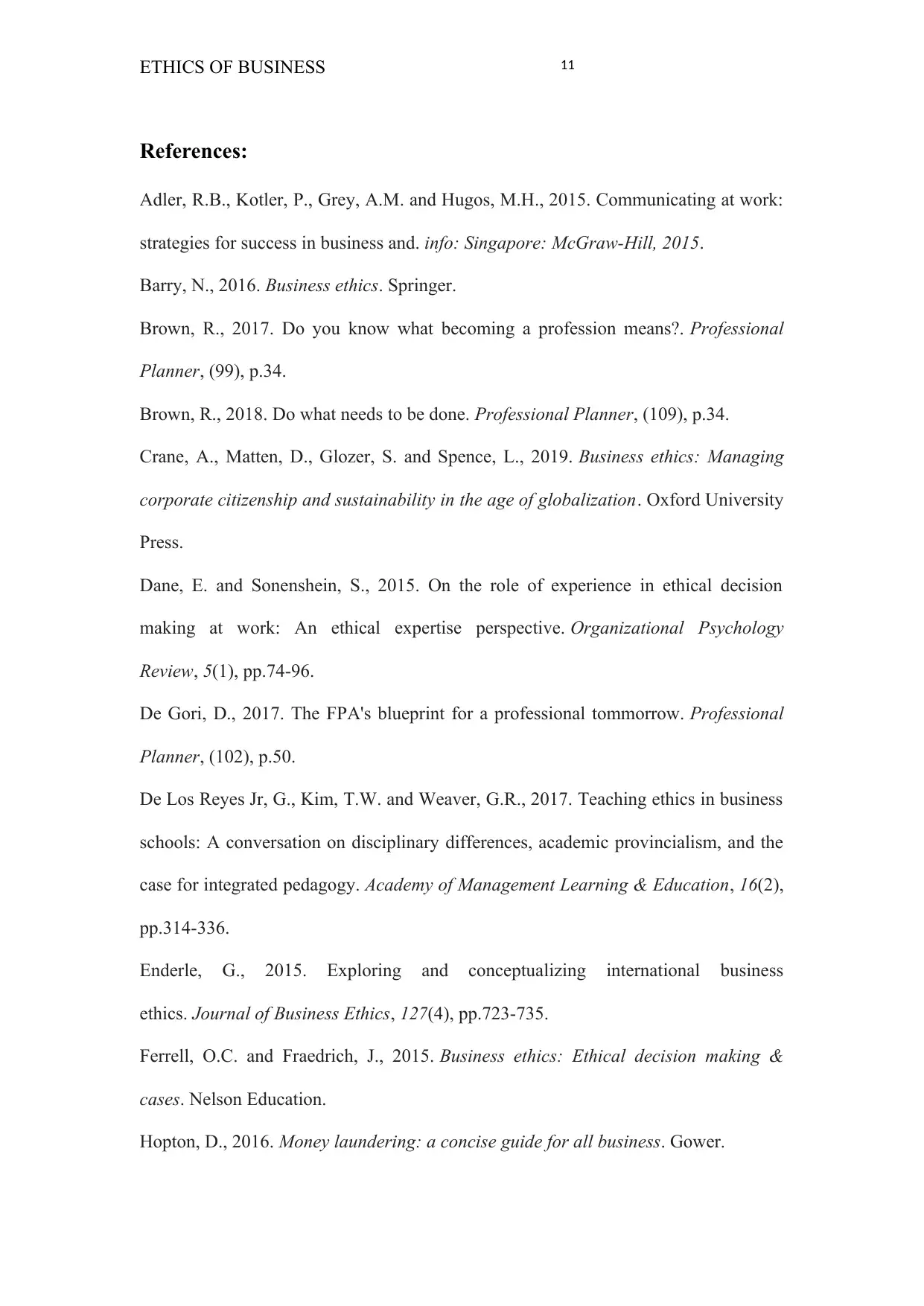
11ETHICS OF BUSINESS
References:
Adler, R.B., Kotler, P., Grey, A.M. and Hugos, M.H., 2015. Communicating at work:
strategies for success in business and. info: Singapore: McGraw-Hill, 2015.
Barry, N., 2016. Business ethics. Springer.
Brown, R., 2017. Do you know what becoming a profession means?. Professional
Planner, (99), p.34.
Brown, R., 2018. Do what needs to be done. Professional Planner, (109), p.34.
Crane, A., Matten, D., Glozer, S. and Spence, L., 2019. Business ethics: Managing
corporate citizenship and sustainability in the age of globalization. Oxford University
Press.
Dane, E. and Sonenshein, S., 2015. On the role of experience in ethical decision
making at work: An ethical expertise perspective. Organizational Psychology
Review, 5(1), pp.74-96.
De Gori, D., 2017. The FPA's blueprint for a professional tommorrow. Professional
Planner, (102), p.50.
De Los Reyes Jr, G., Kim, T.W. and Weaver, G.R., 2017. Teaching ethics in business
schools: A conversation on disciplinary differences, academic provincialism, and the
case for integrated pedagogy. Academy of Management Learning & Education, 16(2),
pp.314-336.
Enderle, G., 2015. Exploring and conceptualizing international business
ethics. Journal of Business Ethics, 127(4), pp.723-735.
Ferrell, O.C. and Fraedrich, J., 2015. Business ethics: Ethical decision making &
cases. Nelson Education.
Hopton, D., 2016. Money laundering: a concise guide for all business. Gower.
References:
Adler, R.B., Kotler, P., Grey, A.M. and Hugos, M.H., 2015. Communicating at work:
strategies for success in business and. info: Singapore: McGraw-Hill, 2015.
Barry, N., 2016. Business ethics. Springer.
Brown, R., 2017. Do you know what becoming a profession means?. Professional
Planner, (99), p.34.
Brown, R., 2018. Do what needs to be done. Professional Planner, (109), p.34.
Crane, A., Matten, D., Glozer, S. and Spence, L., 2019. Business ethics: Managing
corporate citizenship and sustainability in the age of globalization. Oxford University
Press.
Dane, E. and Sonenshein, S., 2015. On the role of experience in ethical decision
making at work: An ethical expertise perspective. Organizational Psychology
Review, 5(1), pp.74-96.
De Gori, D., 2017. The FPA's blueprint for a professional tommorrow. Professional
Planner, (102), p.50.
De Los Reyes Jr, G., Kim, T.W. and Weaver, G.R., 2017. Teaching ethics in business
schools: A conversation on disciplinary differences, academic provincialism, and the
case for integrated pedagogy. Academy of Management Learning & Education, 16(2),
pp.314-336.
Enderle, G., 2015. Exploring and conceptualizing international business
ethics. Journal of Business Ethics, 127(4), pp.723-735.
Ferrell, O.C. and Fraedrich, J., 2015. Business ethics: Ethical decision making &
cases. Nelson Education.
Hopton, D., 2016. Money laundering: a concise guide for all business. Gower.
⊘ This is a preview!⊘
Do you want full access?
Subscribe today to unlock all pages.

Trusted by 1+ million students worldwide
1 out of 13
Related Documents
Your All-in-One AI-Powered Toolkit for Academic Success.
+13062052269
info@desklib.com
Available 24*7 on WhatsApp / Email
![[object Object]](/_next/static/media/star-bottom.7253800d.svg)
Unlock your academic potential
Copyright © 2020–2026 A2Z Services. All Rights Reserved. Developed and managed by ZUCOL.





